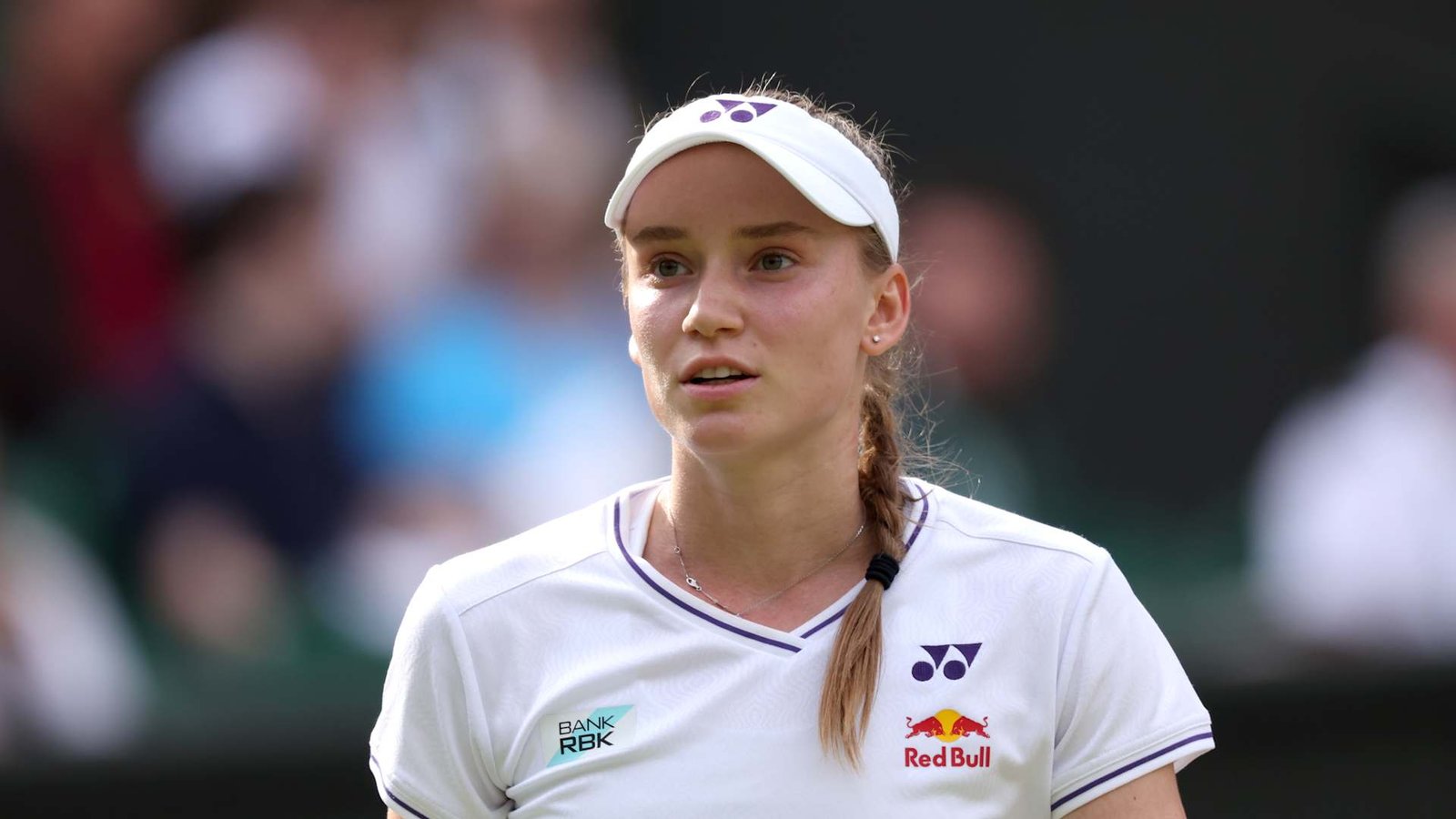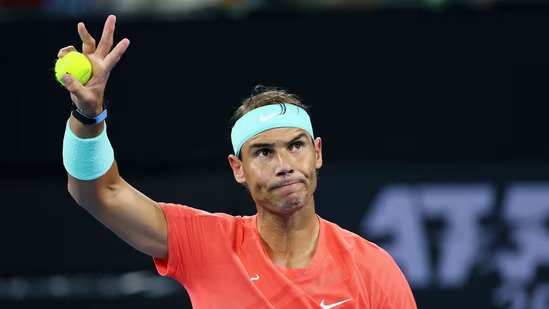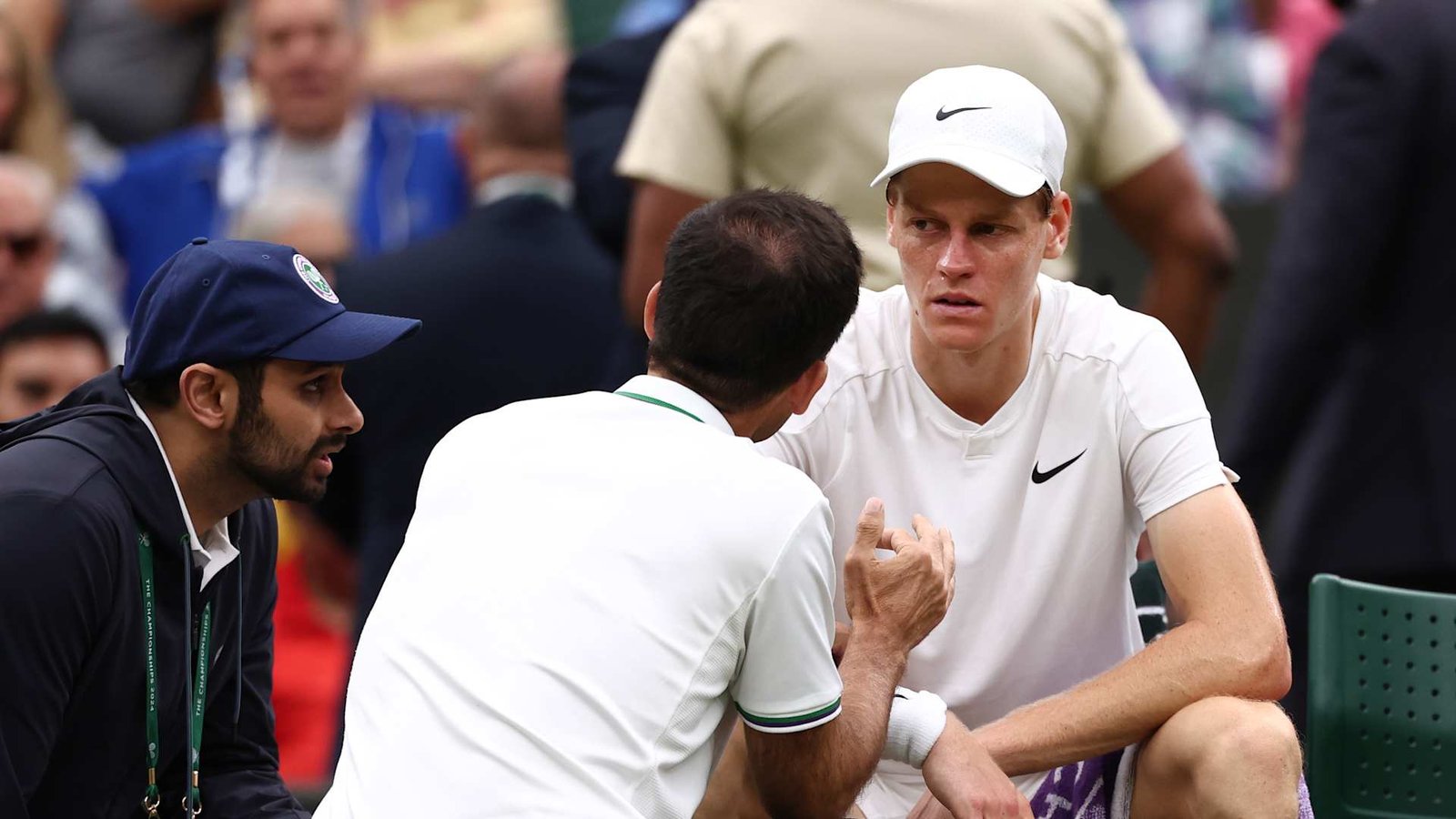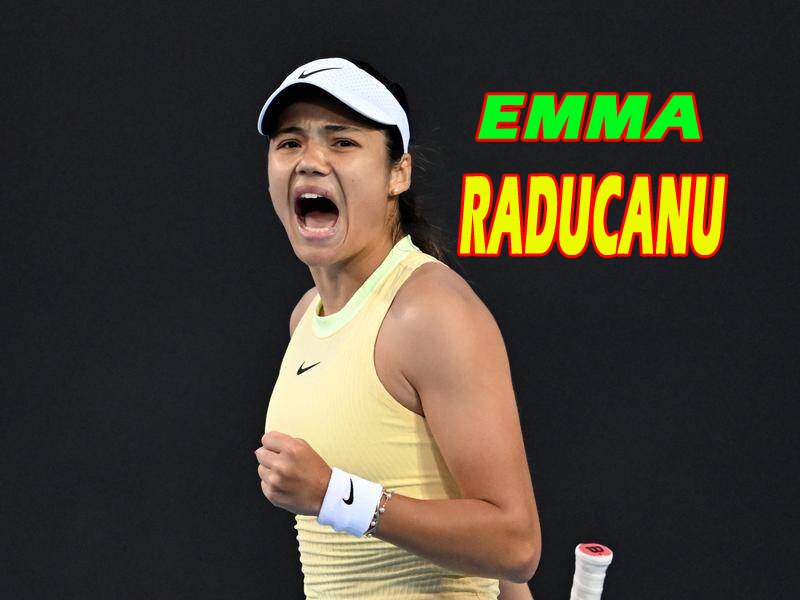Wimbledon 2024 showdown: Marketa Vondrousova and Elena Rybakina, the most recent Wimbledon winners in 2022 and 2023, respectively, are preparing to dispel naysayers on the esteemed grass courts once more.
Vondrousova is renowned for her deft left-handed elegance, while Rybakina is famed for her strong serves. Despite having different playing styles, the two are motivated to show that their Wimbledon triumphs were not coincidental.
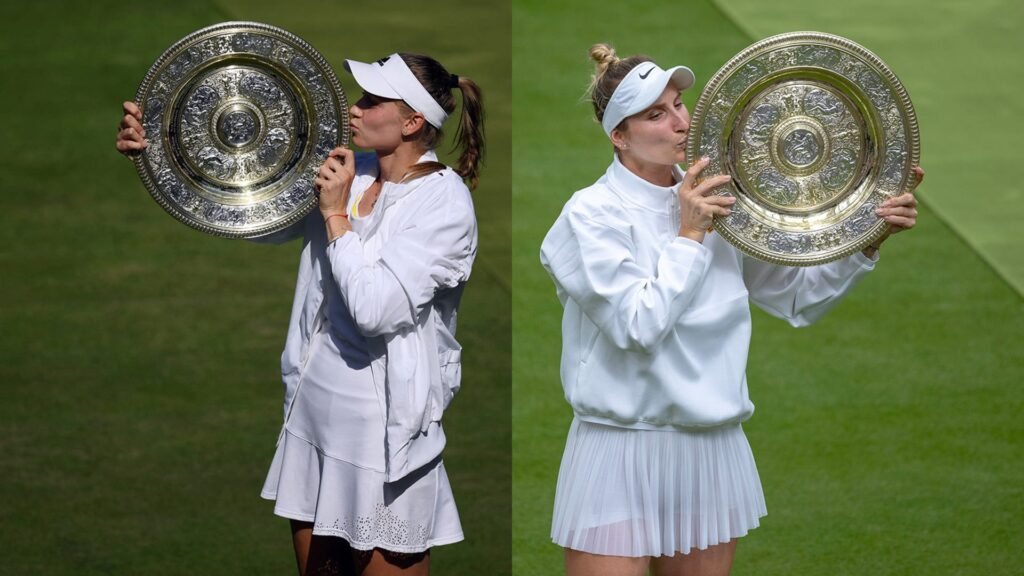
The 25-year-old Kazakh who was born in Russia, Rybakina, is a 6-foot tall right-hander with a powerful game, especially when serving, and the WTA No. 4 ranking to match. Southpaw Vondrousova, 24, is 5’6″ and has a cunning style of play that is more enchanted than frightening. Although prone to injuries and less reliable than Rybakina, the most recent in a long series of Czech Grand Slam singles champions is once again ranked sixth.
What the ladies have in common, though, is a desire to demonstrate that their victories on the biggest stage of the game weren’t coincidental. When Russia’s unjustified invasion of Ukraine prevented strong Russian and Belarusian players, including No. 2 ranked Aryna Sabalenka, from competing at Wimbledon in 2022, Rybakina struck gold.
With Ons Jabeur, a finalist, helping her along, Vondrousova earned her spurs. The main plot of the match revolved around the Tunisian player, who was so nervous and wrapped up in the final (for the second year in a row) that it created sympathy and tragedy.
This year, the competition appears to be free for the taking and is accessible to everyone. Throwing a frisbee on the Wimbledon practice courts and not running across a former champion, such as Venus or Serena Williams, Garbine Muguruza, Ash Barty, Angelique Kerber, or Petra Kvitova, preparing for another run seems like it was only yesterday. This year, Germany’s Kerber is probably going to be the only other previous champion in the draw.
Rybakina is in a strong position at the halfway point of an enigmatic year that saw her battle sleeplessness, a virus, and gastrointestinal problems that hindered her play at Roland Garros and caused her to miss the top-tier 1000 events at Indian Wells and Rome. Nevertheless, she finishes the period with a stellar 35-7 record that includes three titles and strong performances in Doha, Miami, and Madrid.
After falling to Jasmine Paolini in a tight three-setter in the Roland Garros quarterfinals, Rybakina said, “I think in the end my legs were not there.” “I’m really happy with the results [this year],” she hurriedly said. I participated in a lot of matches. Good wins against elite players as well (she was 3-2 versus the Top 10). Of course, I’ve missed several events and had a lot of ups and downs. I slightly decreased my body composition [fitness] and weight.
The proverb “horses for courses” also applies to tennis players as they transition between different playing surfaces. Time and again, it has been shown that certain events and the surface just serve to motivate some players while discouraging others with subpar performances. The grass couldn’t arrive any sooner for Rybakina.
When a reporter in Paris asked Rybakina about her favorite “grand stage,” she answered without missing a beat.
“Wimbledon,” was her response. It’s the greatest accomplishment. Although I think every Grand Slam is incredible in a full stadium, Wimbledon will always hold a special place in my heart.
That is not shocking considering Rybakina’s track record at SW19. There, she is 14-2 with victories, quarterfinal appearances, and fourth-round finishes. Turf is a good fit for her generally flat game and rangy athleticism.
The Pole’s lone defeat on clay this season came from her upset of Iga Swiatek in Stuttgart earlier this year, demonstrating her versatility. The world No. 1 commented, “There is not one specific thing [Rybakina does especially well].” To be honest, I believe that she, Aryna, and I are the top players now on the circuit.
Also Read: Mastering Tennis Strokes: A Comprehensive Guide 2024 Updates
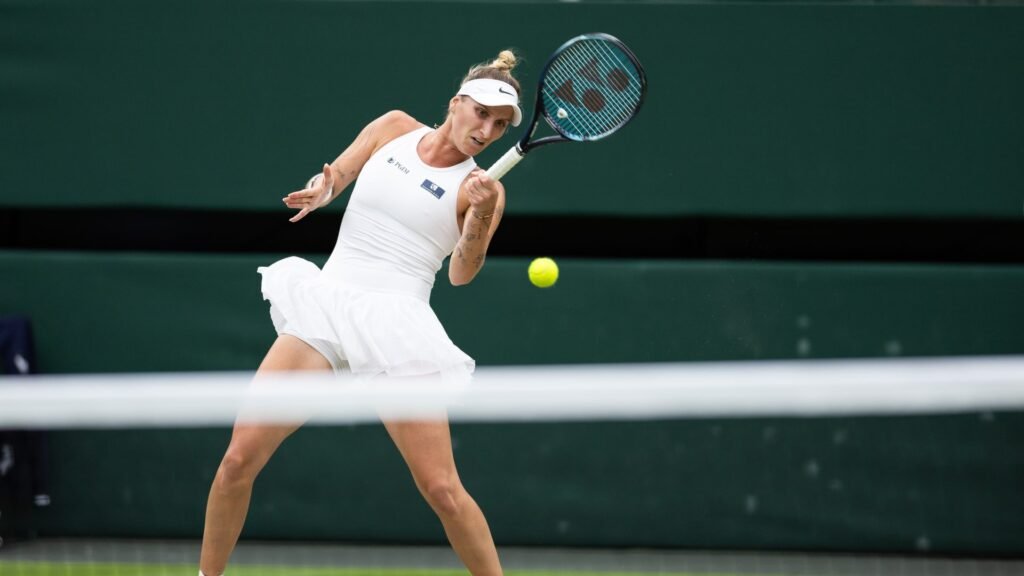
The thing that strikes me about Rybakina, according to former Wimbledon finalist and ESPN pundit Alexandra Stevenson—who knows a thing or two about scorching serves—is that she can be ill or injured and yet come back to win the tournament thanks to her big game and serve.
Furthermore, the number of women on the tour with such a strong game has decreased. That is merely a fact. (In just three additional matches this year, Rybakina has cracked 260 aces compared to second-best Sabalenka’s 165.)
Elina Svitolina remarked of the winner’s serve after losing to Rybakina at Roland Garros this year: “She sometimes goes big, sometimes spins it, and she hits her spots very good.” Thus, it always keeps you alert.
There are certain things Rybakina should do better. Her next logical step towards developing an aggressive mindset would be to improve her transition game and net play. She’s engaged in it.
Attacking the internet, in her opinion, is the only thing to do. “It might be simpler to close some rallies if I get better.”
In addition, Rybakina should do a better job of communicating with the media, even though her opacity and lack of desire to share her thoughts or beliefs have a strange allure. Thinking of Rybakina as the “unassuming champion,” Stevenson vividly remembers her best performance.
Stevenson describes the 2022 Wimbledon event by saying, “She made this huge splash.” “Her aces were the best. the largest serve. Jabeur appeared to be crumbling, and Kate, the Duchess of Cambridge, was present. And Rybakina prevails, but nobody celebrates. She approaches the net and shakes hands as though she has just won Quebec City.
Not every player can maintain composure under duress or maintain a poker face like Rybakina. Vondrousova despises drama just as much as her opponent does. In the previous year’s Wimbledon final, she had never advanced past the third round, but her own poise was evident.
According to Stevenson, “everyone was talking about how this was Jabeur’s moment, her shot at redemption, blah, blah, blah.” However, Vondrousova seized the chance and ran with it. That demonstrated a strong mental fortitude.
Despite having a propensity to lose the plot, Vondrousova’s mind is as supple and resilient as leather. According to Jimmy Arias, the IMG Academy’s director of tennis, “There are moments when she appears to be strolling.” Arias, however, enjoys Vondrousova’s “awkward” style of play. “When she wins, she’s making you look bad instead of herself looking great,” he continued.
The Czech star’s southpaw cunning is the key to her success. Although she lacks some of the explosiveness and/or agility of other elite players, she has a talent for timing her moves and setting the tone for a match.
According to Stevenson, “she can drive you crazy, absorb your pace, redirect your shots, and bother you with that low slice lefty serve.”
For others, Vondrousova’s stunning victory was an accident caused by a fortunate draw and a lackluster opponent in the championship match. Rybakina emerged victorious in a slightly trimmed field. You can only defeat the players who came before you, though, as Stevenson once stated.
According to Stevenson, “Marketa can use her strategy, her brain, and her left hand to play you off the court.” You can’t compete with Elena on the court. When it comes to the two, I dislike when people refer to them as “flukes.”
If both Vondrousova and Rybakina are found to be in good health, they will now have the chance to refute the doubters. Last week in Berlin, during their second-round match against Anna Kalinskaya, Vondrousova slipped and had to retire with right hip soreness two games later, at 5-5.
Due to illness, Rybakina withdrew from her quarterfinal match against Victoria Azarenka four games into the match and chose not to play Eastbourne, citing “a change in schedule” as her reason.

